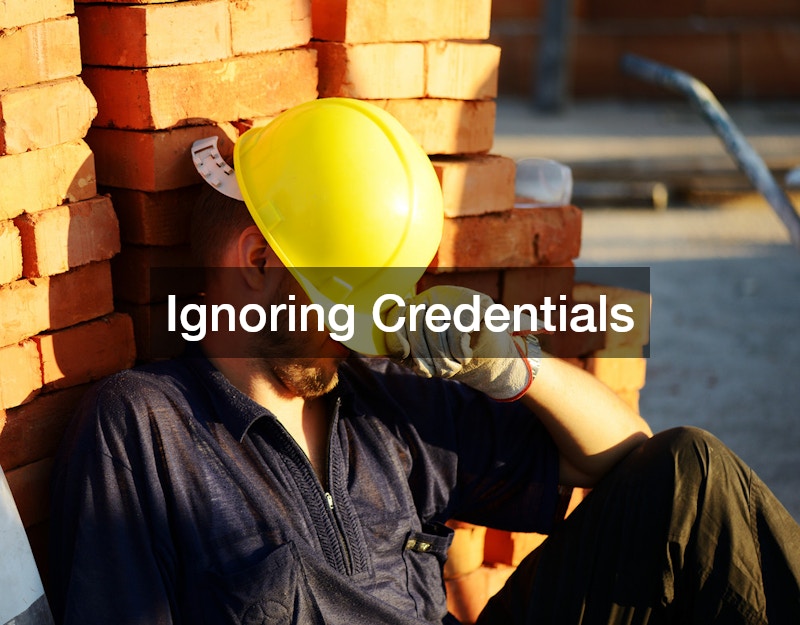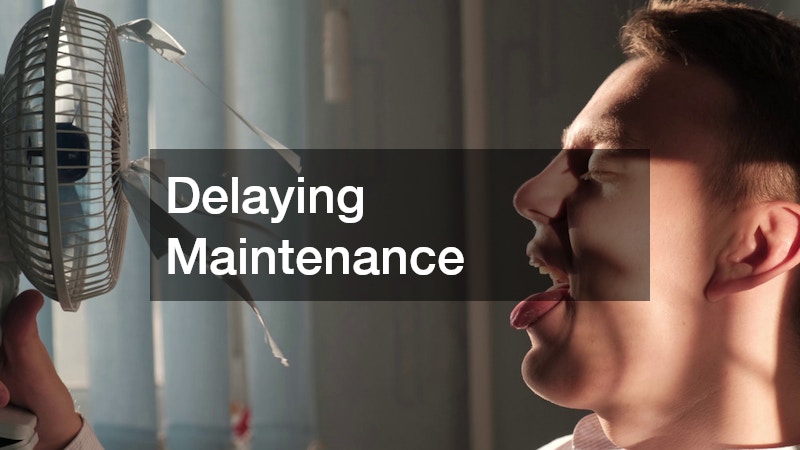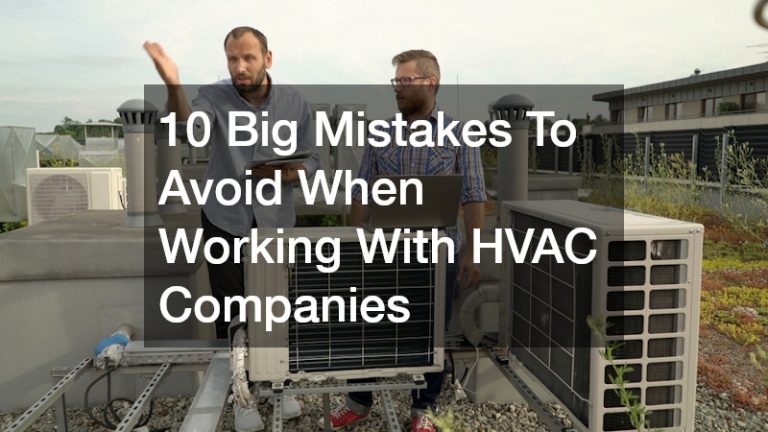When it comes to managing the temperature, air quality, and comfort of your home or business, hiring a professional service team is essential. However, not every interaction with a service provider goes smoothly. There are big mistakes that many people unknowingly make when selecting and working with a heating and cooling provider, and these errors can lead to poor service, inflated costs, and ongoing frustration. Understanding what to avoid before you sign a contract or schedule an installation can make all the difference in ensuring your project goes as planned.
This guide highlights some of the most common errors property owners make when hiring help for air systems, errors that are often overlooked until it’s too late. From skipping due diligence during the research phase to underestimating the importance of clear communication, each point in this list is based on real-world missteps that have cost clients time and money. Some of these misjudgments stem from assumptions, others from a lack of awareness, and some simply because customers don’t know the right questions to ask.
Whether you’re getting new equipment, troubleshooting problems, or considering a full upgrade, being informed about what to avoid is just as important as knowing what to look for. The following ten sections will break down the key things not to do, so you can work with confidence and get the results you expect. With the right approach, you’ll not only dodge common pitfalls but also ensure that your space stays efficient and comfortable year-round.
Skipping Research

One of the biggest initial errors people make is diving into a service relationship without adequate research. The allure of fast fixes or a slick website can overshadow the importance of credibility and history. In the world of home systems, failing to properly vet a provider is one of the classic big mistakes that can haunt you later.
When choosing among HVAC companies, look beyond flashy advertising and get a clearer picture of their real reputation. Many homeowners forget to compare multiple companies, ask about experience, or even confirm that technicians are certified. It’s not enough to trust a brand name or assume quality based on presentation alone.
The best way to protect yourself from this kind of error is to spend a little extra time up front. Seek out customer reviews, ask friends or neighbors for referrals, and verify licenses and insurance. Being thorough in your search can mean the difference between an efficient project and a financial headache.
Not Checking Reviews
Skipping the review-checking process can result in costly regret, especially with something as significant as an air conditioning install. These systems require precise work, and when corners are cut or previous customers have raised red flags, those warnings should not be ignored. Yet too often, people make the big mistake of assuming everything will go smoothly.
For instance, if a provider has a pattern of complaints about faulty installations or poor responsiveness, that should be a major concern. Reading reviews helps uncover consistent issues that may not be visible during your first interaction with a company. Even a polished sales pitch can’t hide a history of unsatisfied customers.
Prioritizing customer feedback before committing to a major project can give you a better understanding of what to expect. Take time to read both the positive and negative reviews and see how the company responds. Transparency in past performance is often a reliable indicator of future service quality.
Ignoring Credentials

Credentials exist for a reason, and yet many customers forget to ask for or verify them. It’s one of the more common big mistakes when hiring help for technical tasks like ventilation and climate control. Licenses, certifications, and insurance coverage all play a role in making sure your technician is qualified to do the job safely and correctly.
Working with a licensed HVAC contractor ensures compliance with local codes and regulations. If a technician is operating without proper documentation, it could result in unsafe work, voided warranties, or even fines down the line. That risk increases if you’re unaware of who’s performing the job on-site.
Always ask for proof of licensing and insurance before work begins. A reliable professional will have no issue providing this information. Confirming credentials might seem like a formality, but it could be the most critical step in protecting your investment and your property.
Missing Site Visits
One of the big mistakes clients make is agreeing to services or quotes without a technician ever stepping foot on their property. Visual inspections are critical when diagnosing issues or planning upgrades, especially for air conditioning and heating repair. A phone estimate may sound convenient, but it rarely accounts for the full picture.
Every property is different, and repair needs can vary based on age, layout, ductwork condition, and system history. If an HVAC provider offers to diagnose or quote work without seeing the system firsthand, it should raise a red flag. A proper site visit allows the technician to identify root problems and avoid band-aid fixes.
Insist on an on-site consultation before making any major decisions. This not only ensures a more accurate assessment, but it also gives you a chance to ask questions and evaluate professionalism. A site visit shows the company values thorough service and isn’t just rushing to close a sale.
Focusing Only on Price

Another of the most common big mistakes is treating price as the only deciding factor when selecting a provider. While budgeting is essential, choosing the cheapest HVAC services without considering value, reputation, and experience can end up being far more expensive in the long run.
Low-cost offers may come with hidden fees, unqualified labor, or substandard materials. Providers offering unrealistically low rates might be cutting corners to make up the difference. If a quote seems too good to be true, it likely is. And if a problem recurs due to a bad job, you’ll be paying for it twice.
Focus instead on what you’re getting for the price. Does the company offer warranties? Are technicians certified? Do past clients recommend them? A fair, competitive rate from a reputable team will usually provide better long-term value than the cheapest estimate with no guarantees. Choosing based on value rather than just price also means fewer surprises and better accountability from the service provider.
Forgetting to Ask
Failing to ask the right questions is one of those subtle, big mistakes that can lead to bigger problems later on. HVAC repairs involve technical details, time-sensitive parts, and specific labor standards, but too often, clients nod along without fully understanding what’s being proposed.
For example, it’s crucial to ask about the timeline for repairs, warranty details, and what happens if the same issue recurs. Without this information, you might find yourself surprised by delays, additional charges, or unresolved issues that should’ve been clarified upfront. Clear expectations prevent confusion and miscommunication.
Make it a habit to come prepared with questions. Ask what’s being fixed, what parts are being replaced, how long the job will take, and what the final cost includes. Being proactive shows you’re informed and helps ensure the company holds up their end of the service promise.
Delaying Maintenance

Waiting too long to schedule needed service is one of the most preventable big mistakes. Many people delay minor fixes in hopes they’ll resolve themselves, but this often leads to bigger and more expensive problems. When it comes to AC repair, what starts as a small issue can quickly turn into a complete system failure if ignored.
A minor refrigerant leak, clogged filter, or worn belt may seem like a small annoyance, but it places strain on the entire system. Left unchecked, these issues can reduce cooling efficiency, hike up energy bills, or even cause damage to the compressor, a far costlier fix. That’s why fast response matters.
Regular maintenance and timely repairs can significantly extend the lifespan of your cooling unit. Don’t wait until the system fails in the middle of a heat wave. Get professional assessments at the first sign of trouble, and schedule annual tune-ups to catch issues before they escalate.
Overlooking Warranties
One of the more overlooked big mistakes is not understanding the warranty terms when installing or servicing heating and air conditioning units. Homeowners often assume their system is automatically protected, only to discover too late that certain work or parts weren’t covered due to technicalities.
Warranties can vary widely by brand, installer, and even region. Some cover parts only, others labor as well, but only under specific conditions. If service is performed by an unapproved technician or if maintenance records aren’t kept, the warranty may be voided. That’s a painful lesson to learn after a costly breakdown.
Always request a full explanation of any applicable warranties and get that information in writing. Know what’s included, how long the coverage lasts, and what actions might jeopardize it. Treat the warranty as part of your long-term investment strategy, not just paperwork to file away. When you’re investing in climate control for your home, a strong warranty can serve as a financial safety net down the road.
Poor Communication
Breakdowns in communication are one of the big mistakes that often lead to frustration, missed appointments, or incorrect work. Good service depends on clear dialogue, and when homeowners don’t speak up or when technicians fail to explain details, the results can be disappointing.
In air conditioning service, especially, misunderstandings about equipment type, performance expectations, or costs can snowball. A technician may assume you want the cheapest fix, while you’re expecting a long-term solution. Or, a client might approve work without realizing it involves extra fees or unplanned downtime.
To avoid these situations, establish clear, two-way communication from the start. Be upfront about your goals, ask for clarification when needed, and ensure everything is confirmed in writing. A provider who communicates well is more likely to deliver high-quality service and handle unexpected challenges with professionalism.
No Written Agreement
Reliance upon spoken agreements instead of written ones is one of the biggest mistakes you can make, which can give you the biggest headaches. When it comes to heating system repairs, a lack of documentation can lead to disputes about pricing, scope of work, timelines, and even liability. Without something in writing, you have little to fall back on if things go wrong.
For example, a technician might quote a price over the phone, but charge more after completing the job. Or they might say a repair comes with a warranty, but without written proof, it’s your word against theirs. Misunderstandings are common when agreements are not laid out on paper.
To avoid confusion and big mistakes and to protect yourself, always request a written estimate and service agreement before work begins. Make sure it includes the cost breakdown, work to be done, estimated completion date, and warranty details. A legitimate company will be happy to provide this—it’s a sign of transparency and professionalism.
Avoiding the Big Mistakes
When it comes to managing your home’s temperature and comfort systems, avoiding the larger mistakes outlined in this article can make a significant difference in both your short-term satisfaction and long-term peace of mind. Working with a qualified service provider involves more than just picking a name from a search result—it requires thoughtful consideration, good questions, and a clear understanding of your rights and expectations.
Throughout this guide, we’ve explored common pitfalls such as skipping research, ignoring credentials, focusing only on price, and failing to get written agreements. Each of these mistakes can derail a project, lead to poor performance, or cost you more than necessary. These issues arise most often when clients rush decisions or trust blindly without doing their homework.
The good news is that every one of these mistakes is preventable. By being proactive in checking reviews, confirming credentials, asking smart questions, and maintaining clear communication, you increase your chances of working with a provider who delivers quality results. Whether you’re repairing a unit, scheduling a new install, or investing in long-term maintenance, the right approach ensures your experience is smooth, effective, and stress-free.
Remember, the key to a successful project isn’t just about the tools or technology. It’s about the relationship you build with your provider. Avoiding these big mistakes puts you on the path to comfort, savings, and confidence in every season.
